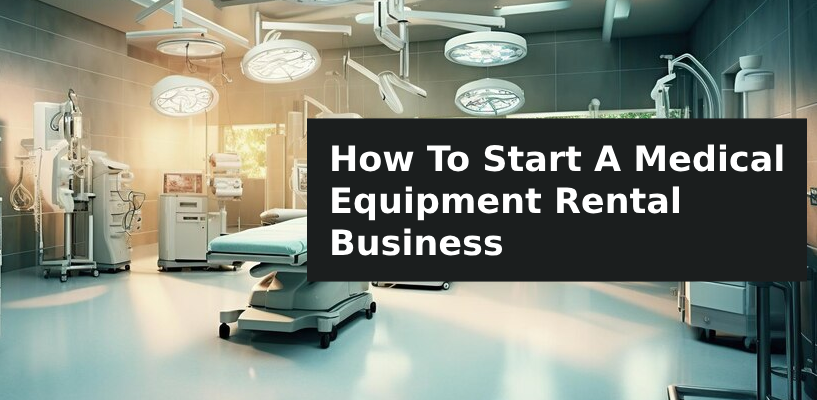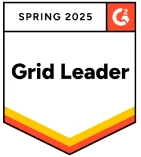How to Start An Online Medical Equipment Rental Business

The medical industry is ever-evolving, with new technologies and treatments emerging at a rapid pace. This constant innovation presents a challenge for healthcare providers who need access to cutting-edge equipment but may not have the budget to purchase it outright. This is where your opportunity lies: establishing a medical equipment rental business that caters to this growing need.
The rental model offers a flexible and cost-effective solution for healthcare providers to access cutting-edge equipment without the hefty upfront investment. But is venturing into this field the right strategic move for your business? Let’s delve deeper.
Is Starting a Medical Equipment Rental Business The Right Choice for You?
The answer depends mainly on your business goals and resources. Are you looking to expand your service offerings? Do you have a strong understanding of the medical equipment market? Are you prepared to invest in inventory and logistics?
If your answers lean towards “yes,” then the medical equipment rental business could be a lucrative and fulfilling venture. But just like any other business, this one also has some pros and cons that you can consider.
Pros
Recurring Revenue: Unlike one-time sales, rentals offer a steady income stream, enhancing financial predictability and stability.
Low Barrier to Entry: Compared to manufacturing or distributing medical equipment, the rental model requires less upfront capital investment.
Market Demand: The demand for medical equipment rentals is rising, driven by factors like ageing populations, technological advancements, and cost-conscious healthcare providers.
Diversification: You can cater to a diverse clientele, from hospitals and clinics to individual patients, expanding your market reach.
Adaptability: The rental model lets you easily adjust your inventory to meet evolving market trends and customer preferences.
Customer Relationships: Building strong relationships with healthcare providers can lead to long-term partnerships and recurring business.
Positive Impact: By providing access to essential medical equipment, you improve patient care and outcomes.
Minimal Inventory Depreciation: Unlike owned equipment, which depreciates over time, rented equipment remains a valuable asset.
Cons
Regulatory Compliance: The medical industry is heavily regulated, requiring adherence to strict standards for equipment maintenance, safety, and documentation.
Insurance and Liability: Comprehensive insurance coverage is essential to protect your business from potential risks and liability claims.
Maintenance and Repairs: Regular and prompt maintenance is crucial to ensure equipment functionality and customer satisfaction.
Inventory Management: Efficient inventory tracking and management systems are necessary to optimize utilization and avoid stockouts.
Competition: The medical equipment rental market can be competitive, requiring a well-defined niche and a strong value proposition.
Pricing Challenges: Determining competitive rental rates while ensuring profitability can be a balancing act.
Market Fluctuations: The demand for specific types of equipment can vary, requiring you to stay attuned to market trends and adapt your inventory accordingly.
Customer Education: Some clients may need guidance on using specialized equipment, necessitating staff training and support resources.
Launch Your Successful Medical Equipment Rental Business
Top Players of the Industry
The medical equipment rental space is dynamic, with a mix of national players and regional providers. Some prominent names include:
Apria Healthcare: A leading provider of home respiratory, sleep apnea therapy, and negative pressure wound therapy equipment.
Rotech Healthcare: Specializes in home oxygen therapy, ventilators, and other respiratory equipment.
US Med-Equip: Primarily serves hospitals and healthcare facilities with rentals of movable medical equipment.
Agility Health: Focuses on acute care equipment rentals and services, including infusion pumps and patient monitoring devices.
These established players offer valuable insights into the market’s potential and challenges. However, there’s ample room for newcomers who can offer specialized services and innovative technology or cater to specific niche markets.
Key Steps to Start Your Own Medical Equipment Rental Business
Market Research and Strategic Planning
A successful medical equipment rental business begins with understanding the landscape.
Identify Your Niche: The medical field is vast. Will you focus on durable medical equipment (DME) like wheelchairs and hospital beds or specialize in higher-tech devices like oxygen concentrators or infusion pumps?
Analyze Your Target Market: Who are your potential customers? Hospitals, clinics, long-term care facilities, or individual patients? Tailor your offerings to their specific needs.
Competitive Analysis: What other rental businesses exist in your chosen market? How do they price their equipment? What are their strengths and weaknesses? This information will help you differentiate your services.
Develop a Business Plan: This critical document will outline your target market, marketing strategies, financial projections, and operational plans. It serves as your roadmap for success.
Navigating the Regulatory Landscape
The medical equipment industry is heavily regulated to ensure patient safety. Before launching your business, it’s essential to be well-versed in the legal requirements.
Licensing and Permits: Obtain all necessary licenses and permits from local, state, and federal authorities. These will vary depending on your location and the type of equipment you rent.
Insurance: Secure comprehensive liability insurance to protect your business from potential lawsuits and claims.
Health and Safety Regulations: Ensure that all rented equipment is properly maintained, cleaned, and disinfected according to industry standards. Comply with all applicable health and safety regulations.
Privacy Laws: Implement robust data security measures to safeguard patient information and comply with HIPAA (Health Insurance Portability and Accountability Act) regulations.
Equipment Procurement and Inventory Management
Your equipment is your most valuable asset. Careful selection and management are key.
Choose Reliable Suppliers: Partner with reputable manufacturers and distributors to ensure the quality and reliability of your equipment. Negotiate favorable terms for purchasing or leasing.
Maintain Adequate Stock: Regularly assess market demand and adjust your inventory accordingly. Avoid overstocking, which ties up capital, or understocking, which could lead to lost business opportunities.
Implement a Tracking System: Utilize inventory management software to track equipment availability, rental periods, maintenance schedules, and revenue generated. This will streamline your operations and provide valuable data for decision-making.
Marketing and Customer Acquisition
Even the best products need effective marketing to reach their target audience.
Build a Strong Online Presence: Develop a user-friendly website showcasing your equipment inventory, rental terms, and contact information. Implement SEO (Search Engine Optimization) strategies to improve your website’s visibility in search engine results.
Network with Healthcare Professionals: Build relationships with doctors, nurses, therapists, and other healthcare providers. They can refer patients to your services.
Participate in Industry Events: Attend trade shows, conferences, and workshops related to the medical field. This provides opportunities for networking and showcasing your offerings.
Utilize Digital Marketing: Employ targeted advertising campaigns, social media marketing, and email marketing to reach a wider audience and generate leads.
The Foundation of Success
Efficient operations are the backbone of any successful rental business.
Implement Rental Management Software: This software simplifies tasks like booking reservations, tracking equipment availability, generating invoices, and managing customer relationships.
Train Your Staff: Ensure that your staff is knowledgeable about the equipment, rental procedures, and customer service. Regular training will improve efficiency and customer satisfaction.
Establish Delivery and Pickup Procedures: Define transparent processes for delivering and retrieving equipment. Consider offering 24/7 availability for emergencies.
Maintain Equipment: Implement a rigorous maintenance schedule to ensure that all equipment is in good working order. Regularly inspect, clean, and repair or replace any faulty items.
Start your journey to success in the medical equipment rental industry today!
Ways to Enter the Online Medical Equipment Rental Market
When venturing into the medical equipment rental business, you have two avenues to consider:
Starting from Scratch
Starting from scratch entails building your rental business from the ground up. This route involves establishing your own brand, sourcing equipment, setting up logistics, developing a website or app for online bookings, and creating marketing strategies to attract customers. While this option offers full control over your business operations and branding, it requires significant time, effort, and capital investment.
White-Label Solutions
White-label platforms provide a pre-built framework for your business, including inventory management, website, and basic branding. It’s a faster route to market but may limit customization options.
Why Our White-label Solution Superior Choice for Your Business
While each approach has its merits, white-label app emerges as the most strategic option for several reasons:
Speed to Market: Launching an app with our white-label solution can take much less time. This means you can start generating revenue and capturing market share much faster than your competitors, who are still stuck in the development phase.
Cost Efficiency: Building a custom app is a significant investment. White-label solutions dramatically reduce costs, as you’re essentially licensing a proven platform instead of funding its entire creation.
Proven Technology: You’re not beta testing an unknown product. White-label apps are typically built on reliable, scalable technology already tested in real-world scenarios. This minimizes the risk of technical glitches and downtime.
Focus on Your Core Business: Instead of deepening app development, you can dedicate your energy to what you do best: providing exceptional medical equipment rental services. The app becomes a tool to enhance your core business, not a distraction.
Customization and Branding: White-label apps allow you to customize the user interface, features, and integrations to perfectly align with your brand identity and your customers’ specific needs.
The Investment: What to Expect?
While developing a custom app can cost hundreds of thousands of dollars, white-label solutions are significantly more budget-friendly. Depending on the complexity of the features you choose, the investment can range from a few thousand dollars to tens of thousands. Considering the time and resources you’ll save on development, a white-label app is an investment with a compelling return on investment.
Your Partner in App Development
White-label solutions offer a fantastic starting point for businesses, but it’s challenging to find services that align with your unique needs. That’s where our app development service comes in. We at Hyperlocal Cloud understand that every business has unique needs and goals. That’s why we offer tailored app development solutions designed to fit your specific requirements.
Our experienced developers will work closely with you to create an app that reflects your brand identity, streamlines your operations, and delivers a superior user experience. Whether you need a simple app to manage your equipment inventory or a complex platform with integrated payment processing and customer support, we have the expertise to bring your vision to life.
Take the Next Step: Contact Us Today!
Are you ready to unlock the potential of the medical equipment rental market? Contact us today for a free consultation. We’ll help you assess your needs, explore your options, and develop a platform that sets your business up for success. Remember, the future of healthcare is in your hands.





